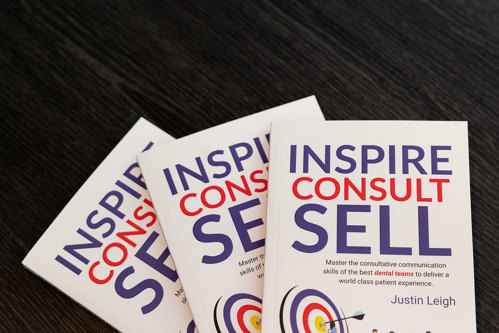Clementine Rees Brown sits down with Justin Leigh to discuss his career from a dental technician to business leader and bestselling author, and the new course Focus4Growth is offering for dental professionals.
How did your career in dentistry begin?
I started as a dental technician 32 years ago. I did an apprenticeship, which was the traditional route, and qualified after four years. I worked in a quite small laboratory at the back of a practice, which was a blessing really because it meant I saw the full clinical workflow for the patient, so we would very often go into the surgery and be asked to give advice or talk to patients about options. It was within those early days when I recognised that my peers in the laboratory did not really like going to the dentist or the patients for discussions and many backed away from it. I became the frontman, in many ways.
When I finished my apprenticeship I quickly realised that I couldn’t see myself in that laboratory environment for the rest of my career, so I applied for a job in sales and fortunately got it! I got offered a position with a retail company called Wright Cottrell - back then they were called Wright Health Group.
What was that next position like?
I started in sales with them in their Dundee offices. I went there for a week and was given some induction training, which I found interesting. As part of the training, I went out and started calling on practices and talking to nurses, receptionists, practice managers, and dentists. I knew at that point I had a bit of a talent for communication and building relationships, which was truly exciting. After a couple of years, I was then approached by Dentsply and decided to go and work for them, even with the little official ‘training’ that I had, I knew it was worth taking the risk.

What did you learn working with market leading companies like Dentsply and 3M?
One of the biggest advantages of working with world leading companies is the investment in professional development. It was working for Dentsply & 3M that I learned how to sell, and how best to communicate. My leadership career took me outside of dentistry, having to suddenly rely on your leadership, business skills, interpersonal skills, and intellectual understanding of marketplaces really helps you realise what you’re capable of. It’s terrifying, but it is one of those situations where you just have to trust yourself and do the best you can. Luckily for me I was able to transition my business skills to different roles, businesses, and markets. I realised eventually that I had moved away from the business aspects I loved, like engaging with people, leading teams, coaching people, sharing best practices and mentoring. The higher up you get in an organization, the less you actually end up doing in terms of face to face learning. So, I left the corporate world in 2017 and retrained as an executive coach. That is when I founded focus4growth to provide senior leadership development and one-to-one coaching. I started to do some training and development, fleshing out programs, and even writing a couple of books along the way!
When did you start to feel the first pull back to the dental industry?
It’s funny, it did somehow start to attract me back without me realising at first, so that’s kind of how I got to where I am today. The first book I wrote, which was on sales, featured lots of examples of working with dental companies. A number of dentists that I knew at that time would ask me, ‘have you got a book that is specifically for dentists?’, I kept saying no and then eventually thought I should get one written! To do that, I took the models from my first book about sales and applied them to the dental practice and surgery. This would help dentists, hygienists, therapists, and almost everyone involved in interactions with patients or leadership. I wanted it to be relevant to anybody in the dental practice.
It is usually said that dentistry is a recession-proof industry. Do you think that that is still the case?
Personally, I think it depends on the practice, but broadly, yes. Many people are still going to need dental treatment, and people are still going to want routine oral care. I think the areas where some are going to have to focus are cosmetic and aesthetic treatment, where patients are still going to want to have the treatments done, but must prioritise what to spend their money on in the current climate.
There are many who I think are perhaps a bit lost in terms of what to do when it comes to growing a private practice. It’s tiring when you are running any business, but when you are running a practice it can be even more so. You’ve got all the responsibilities of the dental practice, treating patients, managing your team, and making sure that everybody is energised to keep working at their best. On top of that, you think- how can I continue to evolve my practice to be at its best? A lot of people find themselves feeling rather worn down by the current situation. I’m a business owner and I completely understand, everybody running a business can find themselves in that situation from time to time. A great deal of finding a solution comes down to leadership and business management, and then being able to effectively communicate your plans with your team and your patients.
Dentistry is different to other sectors in terms of the attitude towards ‘selling.’ Some see the word ‘selling’ as a dirty word, do you think that there is a solution to this?
It’s all in translation, I believe. I think it can be important to reimagine what sales means and recognise it may be different from what you think. Those who do this can often find that their businesses are suddenly growing, their relationships are thriving, and they are seeing opportunities in a very different way. Mainly what they have done is recognise that selling is not about trying to push something onto somebody that they don’t want.
Often people have a natural dislike and distrust of salespeople and salesmanship- the reason for that is that there are too many salespeople who like me early on in my career, haven’t been trained in proper communication skills. One of the things that I talk to my clients about is recognising that sales are about serving the customer, not selling to them. It is about putting the effort into truly understanding what a customer or a patient needs, and then being able to help them find that. Once people recognise that sales are about understanding the customer or the patient, that can entirely change the outcome.
Looking at how salesmanship was viewed in the past in dentistry now feels outdated, and thankfully many people see it as a more nuanced issue than perhaps they did before.
Could you tell us more about the course Focus4Growth is currently offering?
We are taking the models from the book we talked about earlier, and guiding people step by step through each stage, thinking about how they plan and map their practice and their personal and business goals for the future. We help them transform their communication with patients to increase satisfaction and improve case acceptance. Our goal is to help adopt a consultative communication process, it’s effective with patients and with their team members. Depending on your position in the practice, sometimes it’s about influencing and persuading your team to feel their most motivated and energised, helping them to perform at the highest level possible. Other times it’s about having the right conversation with the patient to understand exactly what they need and explain tailored solutions, and we use the proven INSPIRe communication model to help them apply it in practice.
We go through that and so much more throughout The Practice Growth Academy programme. The course lasts for two full days, and together as a group of roughly 30 and we will discuss everything we have spoken about and build a great share a wealth of knowledge and experience. We use the models as a structure, and from the beginning we assign each person coming in an ‘accountability partner’. The idea is that often people go on a training course, and you have all these good intentions you make plenty of notes and then you go back to your office or your practice... and a week later you have forgotten everything. An ‘accountability partner’ is someone who you can check in with for months after the course- or even longer! They are there to help keep everything fresh in your memory and continue building on the foundation you built in your daily working lives, not letting the memories of the course fade quickly away as they sometimes do.
We also designed a useful interactive toolkit that people can use as their guide, and as it is electronic, it is extremely easy to use and share. There is no paper involved on the course, which means you can e-mail your tool kit to your team or send it to somebody with very little effort - so they can start to share best practices and ideas as well!

What kinds of dental professionals do you think will benefit from the course most?
In this first phase, we are looking at dentists, therapists, and hygienists. For future courses, we are looking at how we could evolve the program to be more team-based. We plan to have three offerings available; one will be specifically for improving consults, the other will be about leadership for practice leaders, and then there will be team-based sessions available as well.
Do you think there is ever a ‘one size fits all’ formula for patient communication?
I often find people using the saying within a business, ‘Treat other people as you would like to be treated.’ That to me is completely wrong. I think the only ‘one size fits all’ rule there can ever be is this: ‘Treat others the way they would like to be treated.’ We have to park our own ego, and our judgment, and focus on the other person and their individual needs. We need to gain an understanding of the way they communicate, and the way they process information. Once we understand that, we can communicate in a way that is relevant and compelling to that individual, but until we put the other person first, they are going to feel as if we’re just pushing information towards them, even if they don’t want it. So, for me, that’s an overarching principle.
Do you have any advice for younger professionals within dentistry who are trying to build their confidence and potential, but are worried about making mistakes along the way?
My advice would be to always think about your own professional development first. In situations where you’re looking for a change or more stimulation, think about investing in yourself and your skills. The better you get, the more valuable you will be to the practice and the better the opportunities will be for you in the future. Focus on developing your skills, that is my main piece of advice. Ask the people around you as well, ask your line manager, ‘How can I develop more? How can I add more value to my role?’
Do not wait to be told to do things, just lean in and take the initiative to become as highly valued a member of the team as possible. When you are just going through the motions every day, that is when you can start to feel trapped. If I had taken the mindset of never challenging myself, I may well still be sitting in that lab as a dental technician thirty years later!
To find out more visit www.focus4growth.co.uk/practice-growthacademy


